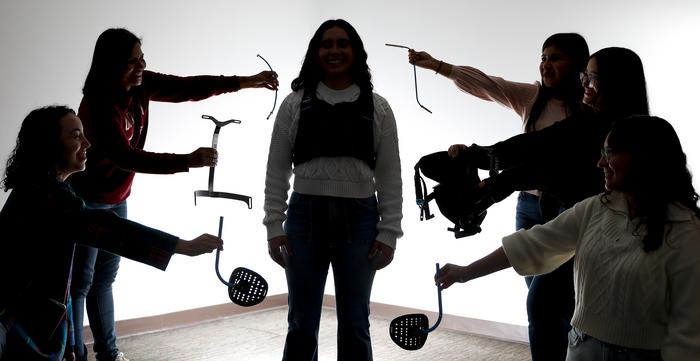EL PASO, Texas (Mar. 21, 2024) – Professors at The University of Texas at El Paso have launched a new industrial engineering lab focused on supporting human performance and behavior in various application areas. Projects include supportive exoskeletons for high-strain occupations and virtual reality that simulates high-stress environments.

Credit: The University of Texas at El Paso.
EL PASO, Texas (Mar. 21, 2024) – Professors at The University of Texas at El Paso have launched a new industrial engineering lab focused on supporting human performance and behavior in various application areas. Projects include supportive exoskeletons for high-strain occupations and virtual reality that simulates high-stress environments.
The facility, known as the Physical, Information and Cognitive Human Factors Engineering (PIC-HFE) Research Lab, was established with the help of a $350,000 STAR grant from the State of Texas.
The lab is led by Priyadarshini Pennathur, Ph.D., and Arunkumar Pennathur, Ph.D., researchers in UTEP’s College of Engineering, and focuses on assisting workers in the construction and healthcare fields, where occupations not only pose risk of physical injury but also may have significant cognitive impacts like workload, stress, and burnout.
Arunkumar Pennathur’s research is centered around exoskeletons, or supportive braces, that can alleviate the health issues faced by individuals who frequently strain their joints on the job.
“Your entire body can be thought of as being made up of links and joints,” Pennathur said. “Mechanically speaking, we’re able to calculate all the forces on your joints and monitor the muscle activity when you’re actually moving, and so each exoskeleton will be specific to relieving stress for certain joints.”
These exoskeletons have the potential to provide an extra layer of support to workers in additional industries such as disaster relief, maintenance, and manufacturing, Pennathur said.
Looking ahead, the researcher envisions using 3D printing to manufacture lighter and more comfortable appendages for individuals to use. This advancement could further enhance the support provided by exoskeletons and improve the overall well-being of workers.
At the other end of the lab, Priyadarshini Pennathur utilizes wall-to-wall immersive virtual reality to simulate high-stress work environments, including emergency rooms, disaster zones, warehouses and greenspaces. Through the use of projectors and goggles, users can experience a 3D rendering of the simulation projected onto the wall and interact with different areas of the simulated space. The technology allows users to perform tasks such as picking up boxes in a warehouse or interacting with patients in an emergency room.
“People can put the VR glasses on, and we can simulate real-world scenarios and tasks in a lab setting,” Priyadarshini Pennathur said. “Using a separate device, we can monitor blood oxygenation levels, we can track their eye movements, we can track their brain activity with electroencephalograms, and we can use face reader technology we have in the lab to track facial muscle movements.”
Priyadarshini Pennathur hopes the virtual reality technology will enable the design and testing of interventions that will ultimately help assess and improve the health and well-being of workers across various industries.
In addition to the Pennathurs’ projects, students across all degree levels are working on diverse projects in the new lab. These include the development of a care process model for caregivers of individuals with dementia, a study of burnout among community health workers using different types of analyses, an examination into how environments can be built to support those with visible and invisible disabilities, and more.
About The University of Texas at El Paso
The University of Texas at El Paso is America’s leading Hispanic-serving university. Located at the westernmost tip of Texas, where three states and two countries converge along the Rio Grande, 84% of our 24,000 students are Hispanic, and more than half are the first in their families to go to college. UTEP offers 172 bachelor’s, master’s and doctoral degree programs at the only open-access, top-tier research university in America.




